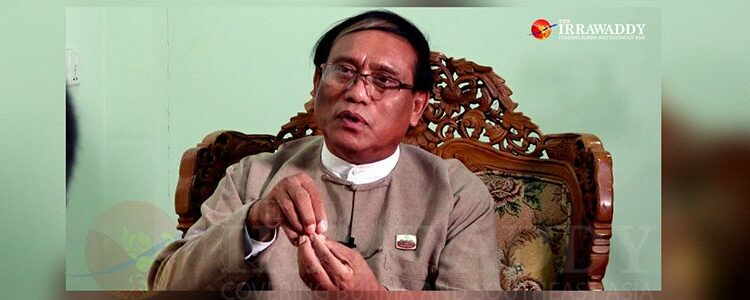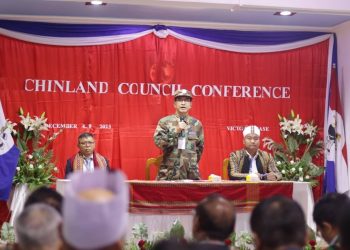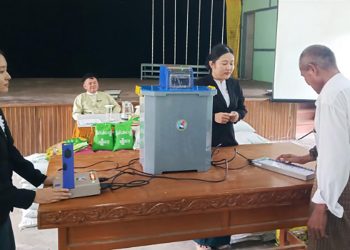Despite possessing abundant natural gas and other resources, and the presence of foreign investment projects like the Kyaukphyu Deep Sea Port, Rakhine State remains the second-poorest in the country after Chin State. Worse, it is riven by ethno-religious strife and an intensifying armed conflict.
Ye Ni, senior editor of The Irrawaddy Burmese edition, discussed relations between the state government and the state parliament, the impact of the armed conflicts in the state and efforts to amend the Constitution with U San Kyaw Hla, the speaker of the Rakhine State parliament, at his office in Sittwe. The Arakan National Party member has been struggling to do his job in the face of many risks and pressures.
Ye Ni: In a democracy, parliament exercises checks and balances over the government. How does the Rakhine State parliament do this?
U San Kyaw Hla: As far as checks and balances are concerned, I would like to say that we exercise checks and balances over the government much more than other regional parliaments do. First, we exercise checks and balances over the government by asking questions. Then, we do so by submitting motions in parliament. As a result, we managed to impeach a minister and forced him to resign—something no other regional parliament has done. This is the highest form of checks and balances.
Rakhine is the second-poorest state after Chin in the entire country. This is despite the fact that not only the state government but also the Union government led by the National League for Democracy and the UEHRD [the Union Enterprise for Humanitarian Assistance, Resettlement and Development in Rakhine]
led by [State Counselor] Daw Aung San Suu Kyi and Union Minister Dr. Win Myat Aye are pushing for economic development in Rakhine State. Do you think their efforts are satisfactory?
I agree that the government is pushing for development in Rakhine State, but doing so alone is not enough. We need to look at the outcomes. In terms of development in Rakhine State, there has not been much progress. We are not satisfied. Progress has been very slow.
Another question concerns budget allocation, which has been a topic of discussion in Rakhine State. Separate budgets were allocated for the northern and southern parts of the state. Could you please explain what is happening?
I don’t want to talk about it in terms of northern and southern parts of the state, though some people look at it that way. The proposed budget for fiscal 2019-20 is very disproportionate. For example, when 50 percent of a budget is allocated, it turns out that 25 percent is for larger areas and 25 percent is for more populated areas. It is like that. And emergency budgets are also allocated.
Therefore, there should not be budget discrepancies among townships. Currently, the budget discrepancies among townships are very wide. Therefore, state parliament representatives are not happy with the proposed budget allocations. Towns in the southern part of the state receive a much greater budget allocation than northern ones. The places where the chief minister and his ministers come from get much more budget allocation than others. Therefore, representatives are unhappy with the proposed budget. Generally speaking, the proposed budget allocation does not reflect the reality. The budget allocation shows the attitudes of the government.
When they submit a budget allocation to the state parliament, we have to advise them. They can accept our advice or reject it. If they reject our advice and submit the budget allocation as a bill, there will be a lot of problems. We don’t want to create problems. So we have given in to them a lot. When the budget is cut off, our township will simply suffer. So we don’t want to reduce the budget but we sometimes have to. Right now, the proposed budget allocation is not equal. We have given our advice to them.
If the government gives it proper thought and addresses the problems in the budget [allocation], we can negotiate a way to approve the proposed budget when the bill is submitted to parliament. However, if they do not accept our advice, there will be difficulties when the bill is submitted.
It is interesting that the home townships of the chief minister and ministers receive more funding than others. It seems they do not have their offices in Sittwe and have set them up in southern parts of the state. Where are their offices located?
For instance, I am the parliament speaker and my constituency is Ponnagyun Township. Chief Minister U Nyi Pu’s constituency is Gwa. Minister U Kyaw Lwin’s constituency is Ramree. Dr. Chan Thar’s constituency is Thandwe. We have to ask whether these constituencies receive more budget allocation because they are [the senior officials’] constituencies. Care should be taken with budget allocation. Officials should be more careful with it. My constituency is among those that receive the smallest budget allocations.
I would like to ask you some questions about the ongoing fighting in Rakhine State. The civil war is expanding gradually. Will it continue to spread? What are your concerns?
We are very worried because the area of fighting is widening and the period of the conflict is growing. We are closely watching the situation. We are watching whether the fighting will stop and a deal will be made between the two sides. We want them to strike a deal. However, it is unlikely and the fighting seems set to continue. If the fighting continues, local people will suffer. I wish it would stop. We wish a deal could be struck between them through dialogue.
As you said, the ongoing fighting has claimed lives. Many people have become IDPs [internally displaced persons]. It is also said that human rights abuses have occurred. Are the right abuses widespread?
Human right abuses are usually associated with conflict. Therefore, there are rights abuses. It is very difficult to talk about them. When it comes to rights abuses, I have to be careful. But there are right abuses. Therefore, we had to submit a motion to the parliament to stop them. The motion was a success. The parliament approved the motion. We also submitted a motion to return the bodies of people who died during military interrogation to their families. We don’t want things like that to continue to happen. Rights abuses are associated with fighting. We are doing what we can in the parliament.
How does the government respond to the motions approved by the parliament?
They have not yet responded to our motions in recent sessions. All our motions were approved by the parliament.
The parliament approved the motion to protest the internet shutdown [ordered by the Union government in eight townships in Rakhine State and one in Chin State]. It has also been said that the shutdown is affecting people’s lives. What would you like to say about it?
There was an emergency motion in parliament concerning the internet shutdown. Internet connection is more important in war zones. Shutting down the internet leads to a cover-up of human rights abuses. No one will see what is happening there. If the connection is maintained, we can see what is happening there through the internet. Now we cannot see what is happening. We cannot know whether there are right abuses or not.
It is the same for the economy and politics. The internet shutdown is not appropriate. Why did they shut down the internet? They should think about it properly.
The government in Naypyitaw says racial hatred and hate speech are being spread through the internet. Unlike in Karen and Kachin states, hatred between the Bamar and the Rakhine has grown. How would you respond to the explanation provided by the government?
This is not a sound excuse. There are two sides to any problem. Both sides will spread hate speech. People in those eight or nine townships cannot spread hate speech. However, people from the other side can still spread hate speech. If the internet is shut down because of hate speech, internet access should be shut down for both sides. It is not appropriate. It is not a correct way of handling the issue.
Hate speech is not acceptable to us, either. We do not like it. It is unacceptable. Why is hate speech spreading? This is important. To address hate speech or deal with the issue, we need to think about why people spread hate speech. If we can find this out, it will be easy to solve the problem.
When we approach a problem, we cannot look at only a few aspects of it. We need to look at all aspects of the problem. As a saying goes: Why did a branch of the tree bend? Because an egret sat on it. We cannot stop there. We must think about why the egret sat there—because there were fish in the pond. We must think about it in that manner. For example, there is instability in Kachin State. Why? Because the Kachin took up arms. This is not the answer. We need to think about why they took up arms and find out an answer. When you get the answer, you can address the issue.
As you say, I recall a hypothesis that says armed conflicts expand when the space for democracy or federalism that ethnic peoples are demanding becomes narrower. At such times, people turn towards armed revolutions or rebellions. Do you agree with this hypothesis?
Absolutely. Armed struggles are caused by a lack of democracy or federalism. In federalism, all of us will have equal rights. Generally speaking, armed struggles are caused by inequality. If all have equal rights, no one will bother to take up arms.
As the state parliament speaker, what would you like to see all parties do concerning the peace process?
Equal rights for all ethnic groups is important. We cannot build a federal union with guns. We mainly need to engage in dialogue. We need to negotiate among ourselves. In negotiations, we need to build an understanding over what should be. The attitude of ‘I will only negotiate with others if I have the upper hand’ will not work.
We are national brethren. The ongoing fighting in ethnic states in Myanmar is a war between brothers. We need to find the answer not as enemies but as brothers. It is wrong to fight against one another. It is wrong to kill one’s own brothers. I want to urge all parties to solve the problems in a brotherly manner. Taking up arms will not provide an answer. There is no other outcome except the suffering of the people.
To end the civil war, it is necessary to build a federal state. To build a federal state, it is necessary to amend the Constitution. What do you think of that idea?
We have to abide by the 2008 Constitution. We have been elected as representative under the Constitution. However, we do not like it. There are many weaknesses in it. Therefore, we need to amend [parts of it]. If we can’t do it right now, we will take time. Most importantly, we must possess a keen desire to do so.
What other comments would you like to make?
What we really need is peace—the restoration of peace in Myanmar. To restore peace, the equality of all ethnic peoples is essential. All ethnic groups must have equal rights. Only when all ethnic groups have equal rights will we be able to restore peace. In addition, if all parties engage in negotiations without strict demands, there will be a chance to restore peace.
Otherwise, it will be a long time before we can restore peace because we push for our own demands with prejudice. The longer we take to restore peace, the more suffering the people will endure. As we adopt people-oriented policies, we must restore peace without fail. Therefore, I would like to urge all parties to endeavor for peace without ego and prejudice.
#IRWpeace

















